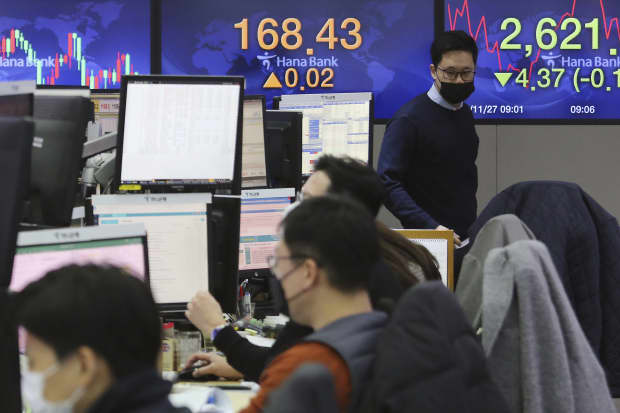This post was originally published on this site

A currency trader passes by screens showing the Korea Composite Stock Price Index, right, and the foreign exchange rate at the foreign exchange dealing room of the KEB Hana Bank headquarters in Seoul, South Korea, Friday, Nov. 27, 2020.
AP
BEIJING (AP) — Asian stock markets were mixed Friday as questions about the effectiveness of one possible coronavirus vaccine weighed on investor optimism.
Benchmarks in Shanghai, Hong Kong and Sydney retreated while Tokyo and Seoul gained.
Investors have been encouraged by reports of progress toward a possible vaccine. But they were uneasy after researchers questioned data that showed a candidate from the University of Oxford and AstraZeneca was 70% effective.
“Market participants showed increasing signs of nervousness as data errors were revealed,” said Mizuho Bank in a report.
The Shanghai Composite Index SHCOMP, +1.14% rose 0.2% and the Hang Seng HSI, +0.46% in Hong Kong was flat. The Nikkei 225 NIK, +0.40% in Tokyo rose 0.4%.
The Kospi 180721, +0.28% in Seoul added 0.3%, while Sydney’s S&P-ASX 200 XJO, -0.53% shed 0.5%.
India’s Sensex 1, -0.17% fell less than 0.1%. New Zealand, Bangkok and Jakarta gained while Singapore retreated.
U.S. markets were closed Thursday for a holiday.
Investors are looking forward to a possible vaccine to control the pandemic that plunged the global economy into its deepest slump since the 1930s, though forecasters warn the stock market rebound might be too early to be sustained.
Those hopes were dented this week when researchers questioned how Oxford and AstraZeneca AZN, -1.81% AZN, -0.66% calculated the effectiveness of their vaccine. That alliance is among researchers who have reported the most progress toward a possible vaccine. The AstraZeneca CEO told Bloomberg News the company might conduct another trial.
Investors also are dismayed that U.S. states and European governments are reimposing controls on business and travel as infection rates surge.
The disease has killed more than 1.4 million people worldwide and there are 61 million confirmed cases, according to data gathered by Johns Hopkins University.
Markets are uneasy about U.S. data showing consumer spending weakening and job losses rising.
Supplemental unemployment benefits that supported consumer spending, the engine of the U.S. economy, have expired. Congress is deadlocked on a possible new aid plan.
In energy markets, benchmark U.S. crude CL.1, -2.27% lost $1.66 to $44.94 per barrel in electronic trading on the New York Mercantile Exchange. Brent crude BRN00, -0.71%, used to price international oils, lost 10 cents to $47.69 per barrel in London.
The dollar USDJPY, -0.21% fell to 103.97 yen from Thursday’s 104.25 yen. The euro EURUSD, +0.12% rose to $1.1923 from $1.1906.

